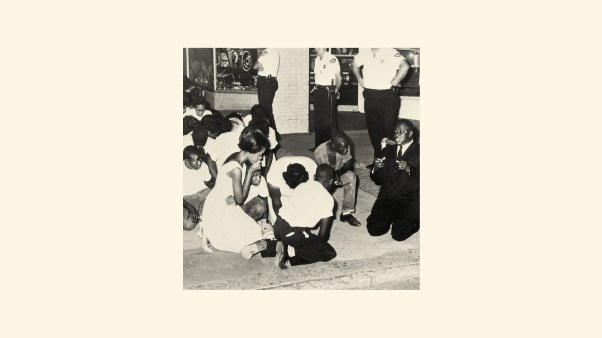Bunyan challenged the Quakers in a number of his works. His first book, in fact, was an attack on Quaker beliefs. Who were these “deceivers,” as he called them, that he wrote so vehemently against?
The movement had its beginnings in 1647 when George Fox began to preach in Nottinghamshire. When he spoke, people sensed the presence and power of God.
Unsatisfied by formal religion, Fox had spent several years as a young man wandering and seeking, questioning clergymen and separatists, but finding no help for his spiritual emptiness. Finally he heard a voice say, “There is one, even Christ Jesus, that can speak to thy condition:” Christ was revealed to him in immediate experience.
Fox soon became the leader of a group of believers, taking the names “Children of Light” or “Friends.” They soon acquired the name “Quakers,” first used derisively by a judge Fox had told to “tremble at the Word of the Lord.”
The Quakers emphasized the inner witness of the Holy Spirit, the “inner light,” and their meetings were marked by charismatic excitement. The age of the Spirit had come, so they saw no need to continue the sacraments of baptism and communion. Christian qualities were more important to them than doctrines. It was more important that a minister practice what he preached than that he be a scholar. Meetings were kept simple to allow worshippers to commune with the Spirit of God.
Quakers met in homes rather than church buildings, and shunned the hypocrisy of fine clothing, most normal amusements, and the use of titles in addressing others. In obedience to Jesus’ words in the Sermon on the Mount, they refused to swear oaths or participate in violence. The movement crossed cultural boundaries, bringing servants and aristocrats to worship together.
Fox’s organizing abilities resulted in a nationwide system of unified meetings and preachers. Quaker missionaries were sent out to the Continent, the New World, and the East, to “walk cheerfully over the world, answering that of God in every one.”
Bunyan could not agree with the Quakers that the Spirit is present in some sense in all persons, not believers only. Calling them “hypocrites” and “enemies to truth,” Bunyan attacked the many errors he saw in Quaker belief and explained his own understanding of the truth. Bunyan’s first anti-Quaker publication (Some Gospel-truths Opened, 1656) was followed the next year by A Vindication of Some Gospel-truths Opened, in which he argued against a Quaker, Edward Burrough, who had responded to his first work. An excerpt from this book demonstrates his attitude:
Some in all former ages have been on foot in the world, ready to oppose the truth: So it is now, there are certain men newly started up in our days, called Quakers, who have set themselves against the truth of our Lord Jesus Christ, and do in very deed deny, that salvation was then obtained by him, when he did hang on the cross without Jerusalem’s gate. Now these men do pretend, that they do verily and truly profess the Lord Jesus Christ; but when it comes to the trial, and their principles be thoroughly weighed, the best that they do, is to take one truth, and corrupt it, that they may thereby fight more stoutly against another. As for instance: They will own that salvation was obtained by Christ. This is truth, that salvation was obtained by Christ, but come close to the thing, and you will find, that they corrupt the word, and only mean thus much, That salvation is wrought out by Christ as he is within; and by it (though not warranted by the scripture) they will fight against the truth: Namely, that salvation was obtained for sinners, by the man that did hang on the cross on Mount Calvary, between two thieves, called Jesus Christ. I say, by what he did then for sinners in his own person or body, which he took from the Virgin Mary, according to the word of God.
Secondly, They will own the doctrine of Christ within. This is truth, that Christ is within his saints: But this doctrine they will take to fight against the doctrine of Christ without, ascended from his disciples into heaven, by whom salvation was obtained, neither is there salvation in any other, Acts 4.12.
Bunyan saw the Quakers not as fellow believers with whom he had some differences of opinion, however serious, but as dangerous enemies to the gospel of Christ.
The following account of one of Bunyan’s many interchanges with Quakers shows more wit than sharpness, yet his disapproval is still evident:
It is recorded that a Quaker once visited Bunyan while he was in jail, saying that he had been through half of the prisons of England, and that he had a message for him from the Lord. “If the Lord had sent you,” retorted Bunyan, “you would not have needed to take such trouble to find me out. for He knows that I have been in Bedford jail these seven years past.”
Copyright © 1986 by the author or Christianity Today/Christian History magazine. Click here for reprint information on Christian History.










